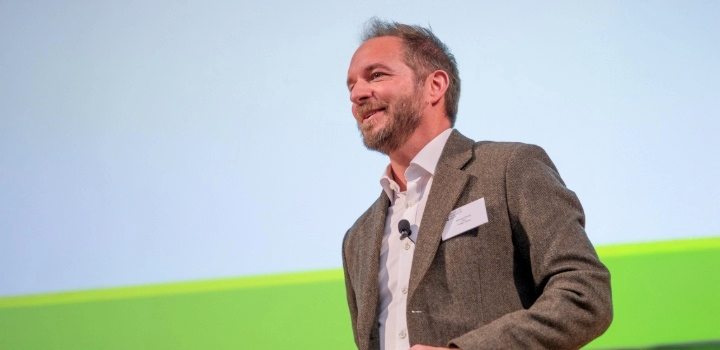RRS Sir David Attenborough begins polar science trials in Antarctica
By: Communications

Researchers from the University of East Anglia have joined the UK’s new polar ship RRS Sir David Attenborough as it begins its polar science trials in Antarctica this week.
A team of 30 national and international scientists, engineers and technical staff departed the Falkland Islands yesterday for almost two months of science capability trials – the first to test the ship’s science capabilities in deep polar waters.
The team will run a range of scientific equipment and systems, several for the first time to test equipment covering physical oceanography, chemistry, and marine biology. They will also work collaboratively to test out the large laboratory facilities to do multidisciplinary research.
The ship has been operating in and around Antarctica since December, delivering key personnel and cargo to British Antarctic Survey’s research stations. As part of getting the ship fully operational for science, these trials will allow the team on board to use science equipment for the first time around Antarctica.
The UEA team will be conducting seawater carbonate chemistry sampling and oxygen measurements as part of the Processes Influencing Carbon Cycling: Observations of the Lower limb of the Antarctic Overturning (PICCOLO) project. The work aims to calibrate sensors on the PICCOLO mooring and profiling floats to be deployed, to test pH sensors and the ship’s underway supply for water sampling ahead of a PICCOLO cruise in 2024.

Those onboard RRS Sir David Attenborough for the trials include postgraduate researcher Daisy Pickup and senior research associate Dr Isabel Seguro, of the Centre for Ocean and Atmospheric Science at UEA. Also part of the team are Prof Karen Heywood, Dr Dorothee Bakker, Prof Carol Robinson and Dr Rob Hall, who will be based onshore at UEA.
Miss Pickup said: “As an Early Career Researcher it’s really exciting to be taking part in the polar science trials and testing the ship that will be used for polar science in years to come!
“I’m keen to learn a lot more about the workings of the ship, whilst also having the opportunity to collect data that will help us understand important carbon dynamics in this region.â€
Dr Seguro, a senior research associate, said: “I am very excited about taking part in the polar science trials. My aim is to leave everything ready for the next scientists to get amazing polar data, especially on the PICCOLO project.
“We are also here to learn, in my case I will get trained on Principal Scientific Officer tasks and gain experience on polar cruise routine and challenges, so I can become a PSO in the future myself. At the moment, the atmosphere onboard could not be better and the ship is really high-tech. I am very honoured to be part of these trials.â€
Prof Heywood, principal investigator for PICCOLO, added: “The PICCOLO mooring and the profiling instruments to be deployed on the SDA polar science trials cruise will provide year-round measurements for understanding some of the key processes controlling Southern Ocean carbon uptake. This is exciting because we will even make measurements when the sea is covered by a layer of sea ice in the winter time, when we can’t usually get any observations.â€
British Antarctic Survey (BAS) operates the RRS Sir David Attenborough, which is owned by UKRI-NERC. It provides a platform for the UK polar community to do research in the Polar Regions.
The trials are another critical milestone in the commissioning of the ship. Prior to these, the ship completed science capability trials around the UK and ice trials in Antarctica during the 2021/22 field season.
Dr Bakker, a chemical oceanographer at UEA, said: “Testing of pH sensors and the ship’s seawater supply for carbonate chemistry sampling will help us deliver the PICCOLO process cruise on RRS Sir David Attenborough in 2024, so this is an invaluable opportunity to prepare for that and to contribute to the ship’s capability to make new discoveries in the polar oceans in future.â€
Dr Sophie Fielding, Science Capability Coordinator for RRS Sir David Attenborough, is co-leading the polar science trials and is also part of the UEA-led project PICCOLO. She said: “This is a really exciting milestone moment for the ship. It’s our chance to work collaboratively with scientists, engineers, technicians and ship’s crew to test all the new and exciting science capability we have.
“There are winches that will allow us to sample animals that live on the sea floor, deeper than we’re ever done before and new equipment to enable us to sample trace metals in the ocean using a dedicated clean chemistry system.
“We are carrying out these trials to test all science equipment and or systems to make sure they all work successfully, and we’re looking forward to putting the ship’s science capability through its paces and doing some cutting-edge science at the same time.â€
Keep up to date on the polar science trials here: https://www.bas.ac.uk/polar-operations/sites-and-facilities/ship/sda-science-trials/ and via social media channels by following #SDAscience.
Related Articles

Michael Grange appointed as new Royal Society Entrepreneur in Residence
Michael Grange has been appointed as the new Royal Society Entrepreneur in Residence for the Faculty of Science, following in the footsteps of Dr Soraya Jones who previously held the role.
Read more
Ultra low frequency gravitational waves detected in space
Researchers at the University of East Anglia are part of an international team that have found evidence for ultra-low-frequency gravitational waves in space.
Read more
Study of Earth's stratosphere reduces uncertainty in future climate change
New research led by the University of East Anglia (UEA) reduces uncertainty in future climate change linked to the stratosphere, with important implications for life on Earth.
Read more